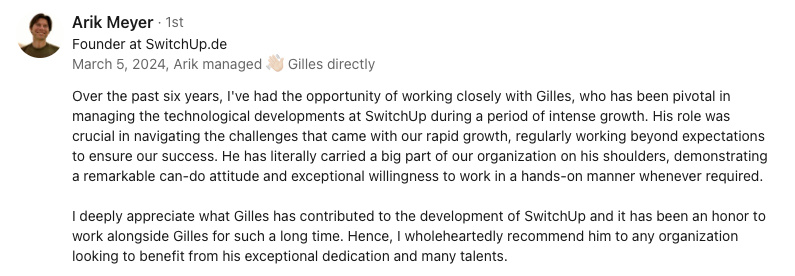Abstract:
The article explores the challenges faced by European tech startups in implementing strong security measures amidst financial constraints, talent shortages, and limited infrastructure. It emphasizes the critical importance of data protection for survival and compliance with regulations like the GDPR, highlighting the need for startups to prioritize security to build trust with clients. Practical, affordable solutions such as open-source cryptographic libraries and cloud services are recommended, allowing startups to secure their data cost-effectively. The article stresses the value of balancing security with system performance through methods like Elliptic Curve Cryptography and hardware acceleration. Real-world examples, such as Ledger and Zerion, illustrate success in maintaining security without compromising efficiency. The discussion also includes the role of scalable security architectures, modular solutions, and cloud-based tools in supporting growth. Emphasizing workforce considerations, the article advocates upskilling current teams and fostering a security-first culture to address talent gaps. It underscores cryptography's role in regulatory compliance and building digital trust while encouraging engagement with tech communities for innovation and future-proofing against emerging threats like quantum computing. Overall, the article provides a comprehensive guide for startups to navigate security challenges and establish themselves as reliable entities in the tech industry.
In the bustling world of tech startups across Europe, the journey toward innovation is fraught with challenges. Financial constraints, a shortage of specialized talent, and limited infrastructure can make robust security seem difficult to achieve. For many startups, navigating these challenges while safeguarding data is not just important—it's essential for survival. The stakes are high, and complying with regulations like the GDPR adds to the pressure. Yet, startups must prioritize security to protect sensitive information and build trust with clients. This article explores practical, affordable solutions that help startups implement strong cryptographic measures without excessive spending, making security feasible even with tight budgets.
Understanding Resource Constraints
In the rapidly evolving landscape of European tech startups, resource constraints often shape both challenges and priorities. Managing these constraints while maintaining security is tough but crucial for any startup aiming for success.
Typical Constraints
Many European tech startups face financial hurdles. Limited budgets often lead to prioritizing urgent business needs over the latest technologies. This can hinder startups from investing in the advanced tech infrastructure needed for robust security. Without substantial financial backing, implementing cutting-edge systems like high-level encryption protocols is challenging. Despite these financial limits, startups cannot overlook security's importance, which is vital for protecting sensitive data and maintaining customer trust.
Another significant challenge is the lack of talent, particularly in cryptography and cybersecurity. Startups may struggle to attract and retain experts who can design and build sophisticated security systems. The high demand for skilled professionals often leaves startups with few candidates, complicating security efforts. This shortage can severely impact a startup's ability to fend off cyber threats and maintain a strong security posture.
Infrastructure limitations add further complexity. Many startups lack state-of-the-art facilities or resources to integrate comprehensive security systems. Setting up a Public Key Infrastructure (PKI) or deploying robust SIEM systems can be difficult without adequate tech support. Startups must juggle these constraints while focusing on security in their dynamic operational landscapes.
Security Prioritization
Even with limited resources, prioritizing security is crucial for startups to comply with regulations like the GDPR. Compliance with such regulations is mandatory and requires careful attention to data protection and privacy. Failing to meet these standards can lead to substantial penalties and loss of consumer trust, making security a necessary investment.
Beyond compliance, strong security practices are essential for building digital trust. This trust is key to valuable relationships with customers and partners. Through effective cryptographic measures, startups demonstrate their commitment to safeguarding data. In my experience managing a startup's security strategy in Berlin, I found that strong security not only facilitated smoother tech partnerships but also enhanced client confidence, proving that even with constraints, a focus on security leads to success.
Cost-effective Cryptographic Solutions for Startups
Cryptographic security is crucial for startups, but many struggle to implement these measures economically. Fortunately, there are affordable tools and services for budget-conscious businesses. By using open-source libraries and cloud services wisely, startups can secure their data without overspending.
Affordable Tools
Open-source cryptographic libraries like OpenSSL and GnuPG are excellent for startups seeking strong security without high costs. These tools offer reliable solutions for data encryption and digital signatures, essential for data integrity and confidentiality. OpenSSL supports various cryptographic algorithms and protocols, making it popular for securing web servers and email clients. GnuPG is ideal for encrypting and signing data, ensuring secure communication and file protection. These libraries are not only cost-effective but also maintain high security standards, proving startups don't need to compromise quality for affordability.
Cloud-based services provide scalable security solutions with flexible pricing, perfectly fitting startups' changing needs. Amazon Web Services Key Management Service (AWS KMS) offers a managed solution for creating and controlling encryption keys. Its pay-as-you-go model allows startups to scale usage as needed without large upfront costs. By using AWS KMS, startups can integrate encryption into their existing infrastructure, ensuring security while allowing business growth. Together, open-source tools and cloud services offer a balanced approach to strong cryptographic security on a budget.
Leveraging Open-source
Open-source tools bring significant cost savings and strong security features to startups, freeing funds for other business needs. The benefits extend beyond financial savings:
- Cost-efficiency: Free to use, eliminating the need for expensive licensing.
- Customizability: Allow modifications for tailored security needs.
- Support: Large, active communities provide help and updates.
These aspects help startups maintain high-security standards without overstretching resources. The open-source community regularly updates these tools, keeping them secure and reliable. Regular patches and community-driven improvements address new threats, maintaining the tools' relevance in a rapidly changing security landscape. This active support network gives startups confidence that their security systems have strong, ongoing backing.
By balancing security and cost, startups can focus on their main goals, trusting their data protection needs are well-managed through open-source and cloud-based cryptographic tools.
Optimizing Performance with Security
While implementing strong cryptographic security is vital for startups, maintaining system efficiency is equally important. By carefully integrating cryptographic solutions, startups can achieve strong security without compromising performance.
Balancing Security and Performance
One effective approach is using Elliptic Curve Cryptography (ECC), which balances security and performance well. Unlike traditional methods, ECC offers the same security level as RSA with much smaller key sizes. This means less computational demand and faster processing times, especially helpful for startups with limited hardware resources. ECC's advantage lies in providing strong security without a heavy computational load, allowing businesses to secure data while keeping operations smooth.
Hardware solutions can further boost performance. By using hardware acceleration and asynchronous processing, startups can shift cryptographic tasks away from the central processing unit. This maintains system responsiveness while handling intensive cryptographic operations. For example, using Intel's AES-NI, a set of CPU instructions for cryptographic tasks, can significantly improve efficiency. Such practical implementations show how startups can leverage modern hardware capabilities for both secure and efficient systems.
Case Studies
Real-world examples illustrate how startups balance security and performance. Ledger, a French startup, uses secure element technology—similar to credit cards—to protect cryptocurrencies. This method ensures robust security without compromising user experience. Ledger's success, evidenced by millions of wallets sold globally, demonstrates the outcome of valuing both security and operational efficiency.
Zerion, a UK-based startup, offers another example with its cryptographic protocols for managing digital assets. By integrating blockchain's security features, Zerion ensures secure transaction management without slowing system performance. Its user-friendly design allows easy interaction with DeFi protocols, proving strong security can coexist with efficient digital asset management. As startups like Ledger and Zerion succeed, scaling security architectures remains a focus for the evolving tech landscape.
Scalable Security Architectures
Creating a security architecture that grows with your startup is essential for maintaining strong data protection as your business expands. Implementing scalable solutions ensures security measures can evolve with technological and resource changes, without needing a complete overhaul.
Modular Solutions
Modular cryptographic solutions give startups the flexibility to build security architecture step by step. This lets businesses focus first on core security needs, like encryption and authentication, and expand as resources allow. Each system module works independently, enabling upgrades or enhancements without disrupting the whole architecture. This approach aligns with budget limits and supports operational flexibility, letting startups allocate resources where most needed. Modular systems' benefits are clear: they provide a structured path for security enhancements, tailored to a startup's needs and resources.
Prioritizing essential security components helps startups manage budgets effectively. Focusing on vital aspects, like encryption and secure communications, allows building a strong foundation without high initial costs. As resources grow and needs change, more security functions can be added to this foundation. For startups, cloud-based services offer an ideal solution, combining scalability and managed costs. These services let startups expand security measures as the business grows, keeping security infrastructure in step with growth, protecting data and trust.
Cloud-based Security
Cloud-native tools present a compelling case for startups needing scalable and flexible security solutions. These tools often include built-in security features that can adapt as the organization evolves. By using these capabilities, startups can ensure security measures grow with their business, enhancing protection without significant re-investments in infrastructure. The cloud services' built-in versatility ensures seamless new security feature integration, matching organizational growth pace.
Using cloud services minimizes upfront costs often tied to infrastructure investments. This lets startups avoid costly initial in-house system setups, focusing on core business activities. With flexible pricing models, cloud services provide an affordable, scalable option for growing demands. Securing the right talent remains key, but the reduced infrastructure burden lets startups allocate more resources to recruitment and development, maintaining a strong, responsive security stance.
Workforce and Talent Considerations
In the fast-paced startup world, attracting and retaining technical talent capable of advanced cryptographic solutions is a necessity. Addressing this involves strategic investment in both upskilling current teams and fostering a security-first culture, ensuring all employees align with organizational security goals.
Upskilling Teams
To bridge the cryptography talent gap, enhancing current employees' skills is crucial. Offering training and certification opportunities can empower your team to handle complex cryptographic challenges, offsetting talent shortages. Consider these strategies:
- Training Courses: Encourage online course enrollment via platforms like Coursera and LinkedIn Learning, covering various cryptographic skills.
- Certifications: Support employees in pursuing industry-recognized certifications like CISSP or CISM to validate expertise.
- Industry Engagement: Encourage participation in webinars and conferences to enhance knowledge and stay updated on security trends.
Engaging with industry events provides further learning opportunities, building internal expertise and fostering a proactive security environment.
Promoting a Security Culture
Creating a security-first mindset across the organization ensures employees naturally understand and prioritize security. This cultural shift is critical for maintaining robust security practices amidst evolving threats.
Integrating security into company culture means embedding it in every aspect, from onboarding to daily operations. This makes employees vigilant and security-conscious, aware of their role in protecting digital assets and data integrity. Recognizing and rewarding security-conscious behaviors further strengthens this culture, promoting ongoing vigilance and accountability among staff.
Acknowledging these behaviors motivates employees to maintain high security standards and creates a positive feedback loop enhancing organizational security. Such recognition can be simple verbal appreciation or formal acknowledgment in performance reviews, fostering a culture where security is everyone's responsibility. As a result, commitment to security becomes ingrained, contributing to a cohesive and resilient organizational fabric.
By focusing on upskilling teams and embedding security as a core value, startups can navigate talent acquisition and retention challenges, ensuring they stay secure and competitive in the digital age.
Cryptography and Regulatory Compliance
Achieving compliance with data protection regulations like the GDPR is crucial for maintaining a startup's operational integrity. Cryptographic measures are key in this process, ensuring user data is protected with strong encryption and efficient key management practices. Adopting robust encryption protocols secures data at rest and in transit, aligning with GDPR's strict data protection requirements, safeguarding user information against unauthorized access and breaches. Regular audits alongside these encryption practices further solidify compliance, ensuring startups meet dynamic data security standards.
Regular audits and penetration testing are vital parts of a startup's commitment to regulatory compliance. These practices ensure cryptographic measures are not only implemented but consistently effective against evolving threats and standards. An actionable checklist includes scheduling routine security audits, engaging third-party experts for unbiased penetration tests, and maintaining thorough documentation of findings and responses. This proactive approach helps identify vulnerabilities and demonstrates a startup’s dedication to maintaining a strong security stance.
Cryptography's Role in Building Digital Trust
For startups aiming for a strong market foothold, building digital trust through cryptography is essential. By implementing robust cryptographic solutions, startups show commitment to safeguarding customer data, fostering trust and reliability. Secure encryption methods, like digital signatures and hash functions, reassure stakeholders of startups' seriousness about data integrity, authenticity, and privacy. This commitment to security fosters confidence among customers and partners, helping startups build lasting trust-based relationships.
Transparency in communication about data protection measures is key in building customer confidence. By openly sharing the cryptographic practices used to secure data, startups enhance credibility and reassure customers about privacy. This openness should include clear privacy notices and regular security enhancement updates. Doing so not only gains customer confidence but positions startups as trustworthy entities, ready to adapt and evolve with emerging tech and security needs.
Future-proofing with Emerging Technologies
As technology evolves, startups face the ongoing challenge of protecting data and operations against future threats. Embracing emerging cryptographic trends is crucial for maintaining long-term security and resilience.
Quantum-resistant Algorithms
Exploring these solutions now prepares startups for future challenges. Quantum computers may soon break traditional cryptographic methods, making sensitive data vulnerable. Quantum-resistant algorithms offer protection against these threats. Implementing them ensures startups remain secure against technological advancements, safeguarding information from potential quantum attacks. Focusing on these solutions keeps data security intact well into the future.
It's wise for startups to start integrating these algorithms now. Doing so positions them ahead of technological shifts, not just responding to them. Proactively engaging with the tech community can bolster these efforts. This proactive approach not only prepares startups for emerging threats but places them at the innovation forefront. Being involved in tech communities and staying informed about advancements ensures startups are ready to implement quantum-resistant measures, building a resilient security posture.
Engaging with Tech Communities
Tech communities offer valuable networking opportunities and access to the latest cryptographic research. Startups benefit greatly by joining regional tech communities where collaboration and information exchange thrive. These communities provide invaluable networking prospects, connecting startups with cryptography experts, researchers, and like-minded professionals. By attending events and meetups, startups stay informed about the latest trends and developments in cryptography, remaining competitive and informed.
Collaborative projects within these communities can lead to innovative cryptographic solutions. For instance, regional tech communities often foster initiatives that bring businesses and experts together to tackle pressing cryptographic challenges. Such collaborations result in innovative solutions and help startups integrate cutting-edge techniques more efficiently. The shared knowledge and resources in these communities encourage creativity and problem-solving, enabling startups to develop robust security measures and stay ahead of the curve.
Navigating the challenges of securing your tech startup amidst financial constraints, talent shortages, and infrastructure limitations is daunting. Yet, focusing on cost-effective cryptographic solutions, like open-source libraries and cloud services, helps safeguard sensitive data without straining budgets. Prioritizing security is not just about compliance with regulations like the GDPR; it's about building trust with clients and partners. Leveraging scalable and modular security architectures ensures startups can grow without compromising data protection. Moreover, investing in upskilling teams and fostering a security-first culture lays the foundation for strong defense against cyber threats. By embracing these strategies, startups not only stay secure but also position themselves as trustworthy players in the competitive tech landscape.
You might be interested by these articles:
- Quantum Cryptography: Unbreakable Data Encryption
- Quantum Cryptography Impact on Cybersecurity
- Advancing Security with Cryptography





